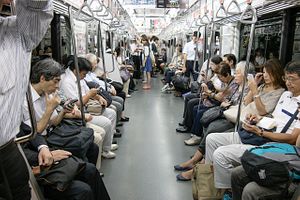Tokyo’s metro system is one of the world’s largest and busiest with a reputation for its back-to-back trains, on-time operations, and extensive yet confusing rail network. But the overcrowded transport system — also notorious for its sardine-packed rush hour — raises doubts as to whether Tokyo can handle the influx of an estimated 700,000 sporting fans and international athletes for the 2020 Olympic Games.
Tokyo Metro rail stretches 195 kilometers and shuttles 8 million commuters daily between the outskirts of greater Tokyo and bustling business districts across the city. But under blistering summer temperatures combined with 100 percent humidity, Tokyo’s overcapacity rail system is prone to buckling under the heat. The weight of crowds could risk collapsing the subway system.
The annual urban train congestion survey conducted by the Ministry of Transport in 2018 revealed that 11 routes exceeded 180 percent congestion. The survey describes 180 percent congestion as being able to read a newspaper while standing up but not being able to fold it in half. In the Tokyo region, the Tozai and JR Yokosuka lines performed the worst, reaching 200 percent congestion (the maximum, 250 percent, describes a scenario of forced contact with the body pressure of surrounding passengers).
Train companies operating on the Hibiya, Nanboku, and Hanzomon lines will test additional services during rush hour through September 6. Riders will also be offered coupons to encourage the use of train services outside of peak times to decentralize rush hour.
A campaign dubbed “Smooth Biz” endorsed by the government and the Olympic Organizing Committee looks to commuters and businesses in an effort to take pressure off the network. The three-part strategy urges Japanese employees to work from home during the games. Staff who are unable to telework due to personal circumstances will be offered temporary satellite work spaces in the suburbs, avoiding the need to head into the office directly. Businesses are also encouraged to coordinate shifts between staff in order to stagger transport use. Between telework, time-shifted work, and increased train service, experts predict a congestion decrease of 2 to 5 percent for lines with a maximum congestion rate between 152 and 168 percent, although it is too early to evaluate progress.
So far 2,292 companies intend to roll out the program in time for the games. The government hopes teleworking will help shift Japan’s rigid working conditions toward flexible working in the long run.
Meanwhile, five traffic jam countermeasure tests will be rolled out this summer to emulate the same dates and conditions expected for next year’s games. But authorities are struggling to make significant improvements to road congestion in inner Tokyo after completing the second mass traffic trial. The Transport Ministry estimates 70,000 Olympic related vehicles will hit the roads, with the additional traffic potentially disrupting Olympic events and business activities. The second “traffic demand strategy” test targeting the Tokyo metropolitan expressway on July 26 saw a reduction of 7.3 percent compared to the same day the year before, which was also an improvement from the first traffic reduction experiment on July 24. Meanwhile, major roads in 15 neighboring locations experienced a 4 percent reduction — a small improvement compared to the 30 percent goal set by the Olympic Organizing Committee.
The government aims to hike the Tokyo metropolitan expressway toll to as high as 3,000 yen (roughly $30) to take cars off the road and ease traffic jams around sporting venues, with special road lanes designated for athlete buses.

































